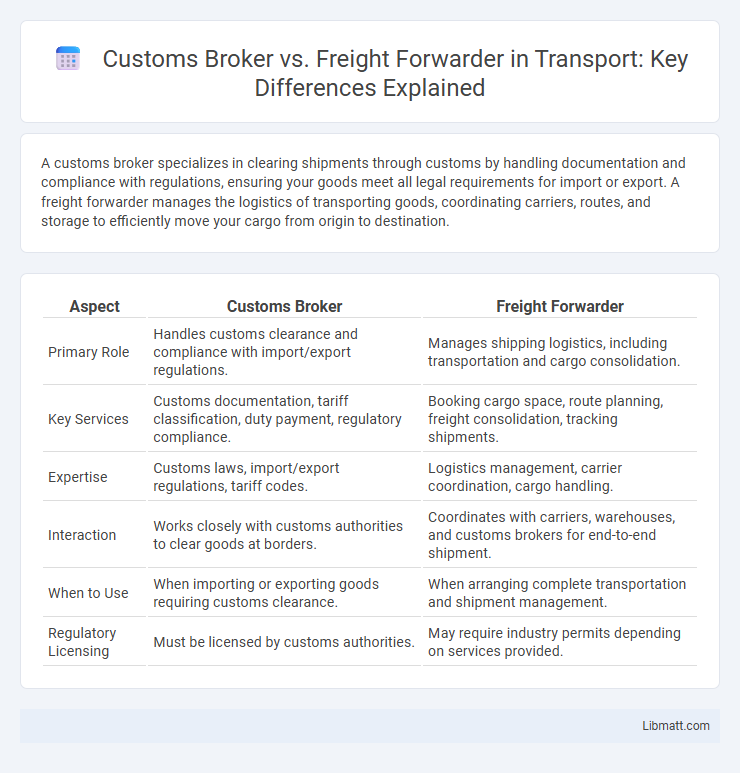A customs broker specializes in clearing shipments through customs by handling documentation and compliance with regulations, ensuring your goods meet all legal requirements for import or export. A freight forwarder manages the logistics of transporting goods, coordinating carriers, routes, and storage to efficiently move your cargo from origin to destination.
Table of Comparison
| Aspect | Customs Broker | Freight Forwarder |
|---|---|---|
| Primary Role | Handles customs clearance and compliance with import/export regulations. | Manages shipping logistics, including transportation and cargo consolidation. |
| Key Services | Customs documentation, tariff classification, duty payment, regulatory compliance. | Booking cargo space, route planning, freight consolidation, tracking shipments. |
| Expertise | Customs laws, import/export regulations, tariff codes. | Logistics management, carrier coordination, cargo handling. |
| Interaction | Works closely with customs authorities to clear goods at borders. | Coordinates with carriers, warehouses, and customs brokers for end-to-end shipment. |
| When to Use | When importing or exporting goods requiring customs clearance. | When arranging complete transportation and shipment management. |
| Regulatory Licensing | Must be licensed by customs authorities. | May require industry permits depending on services provided. |
Understanding the Roles: Customs Broker vs Freight Forwarder
Customs brokers specialize in ensuring your shipments comply with all import and export regulations, managing documentation, tariffs, and duties to facilitate smooth customs clearance. Freight forwarders coordinate the logistics of moving goods from origin to destination, handling transportation, warehousing, and freight consolidation across multiple carriers. Understanding their distinct roles helps optimize global supply chain efficiency and ensures your shipments navigate regulatory and logistical challenges effectively.
Key Responsibilities of a Customs Broker
Customs brokers specialize in ensuring shipments comply with all customs regulations by preparing and submitting necessary documentation, calculating duties and taxes, and facilitating communication between importers, exporters, and government agencies. Their expertise helps prevent delays and avoids costly fines by ensuring that goods meet all import and export compliance standards. Unlike freight forwarders, who manage the overall logistics of cargo transportation, customs brokers focus specifically on navigating customs clearance and regulatory requirements.
Core Functions of a Freight Forwarder
Freight forwarders manage the logistics of shipping goods internationally, coordinating transportation, warehousing, and documentation to ensure timely delivery. They act as intermediaries between shippers and carriers, arranging the best routes and consolidating shipments to optimize cost and efficiency. Your supply chain benefits from their expertise in negotiating freight rates, handling customs clearance, and providing real-time tracking solutions.
Licensing and Regulatory Requirements
Customs brokers must obtain specific licenses from government authorities like U.S. Customs and Border Protection, ensuring compliance with import/export laws and tariff regulations. Freight forwarders, while not always required to hold the same licenses, must comply with transportation regulations and often register with agencies such as the Federal Maritime Commission. Understanding these licensing and regulatory requirements protects Your shipment and ensures smooth customs clearance and logistics management.
Service Offerings: What Each Provider Handles
Customs brokers specialize in clearing goods through customs by handling documentation, ensuring compliance with import/export regulations, and paying duties or taxes on your behalf. Freight forwarders manage the logistics of transporting goods, including booking cargo space, coordinating shipments, and arranging warehousing and distribution. Understanding these distinct service offerings helps you choose the right provider for efficient international trade operations.
Documentation and Compliance Differences
Customs brokers specialize in handling the complex regulatory paperwork required for importing and exporting goods, ensuring your shipments meet all legal customs requirements and avoiding costly delays. Freight forwarders concentrate on coordinating the overall transportation process, including booking cargo space and managing logistics, but typically rely on customs brokers for detailed documentation and compliance expertise. Understanding these distinctions helps you streamline your supply chain by aligning the right professional with your specific documentation and regulatory needs.
Cost Structures and Fees Compared
Customs brokers primarily charge fees based on the complexity and volume of customs documentation and clearance services, often involving flat rates or per-entry fees that cover regulatory compliance and duties calculation. Freight forwarders, in contrast, bundle costs related to transportation, warehousing, and handling, typically offering consolidated pricing that includes shipping rates, freight charges, and surcharge management. Understanding these distinct cost structures helps you optimize logistics expenses by selecting the right partner for either customs clearance or end-to-end freight management.
Choosing the Right Partner for Your Supply Chain
Selecting the right partner for your supply chain involves understanding the distinct roles of customs brokers and freight forwarders. Customs brokers specialize in clearing goods through customs by managing compliance with import regulations, tariffs, and documentation, ensuring smooth entry into your target market. Freight forwarders coordinate the entire logistics process, including transportation, warehousing, and shipment scheduling, optimizing the movement of goods across borders to meet your delivery timelines.
Common Misconceptions and FAQs
Customs brokers and freight forwarders are often confused, but customs brokers specialize in clearing goods through customs by handling documentation and compliance with import regulations, while freight forwarders manage the logistics of shipping goods internationally. A common misconception is that freight forwarders can handle customs clearance without a licensed customs broker, which is inaccurate and may lead to shipment delays or fines. Frequently asked questions include inquiries about who is responsible for customs duties, with customs brokers ensuring accurate tariffs and duties are paid, while freight forwarders focus on selecting optimal shipping routes and modes.
Customs Broker or Freight Forwarder: Which Do You Need?
Determining whether you need a customs broker or freight forwarder depends on your specific shipping requirements; customs brokers specialize in clearing goods through customs by managing documentation and regulatory compliance, while freight forwarders handle the logistics of transporting shipments from origin to destination. If your primary concern is navigating customs tariffs, duties, and ensuring compliance with import/export laws, a customs broker is essential. However, if you require comprehensive logistics services including carrier coordination, warehousing, and route optimization, engaging a freight forwarder will streamline your supply chain effectively.
customs broker vs freight forwarder Infographic

 libmatt.com
libmatt.com